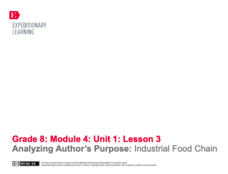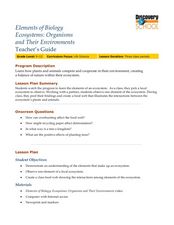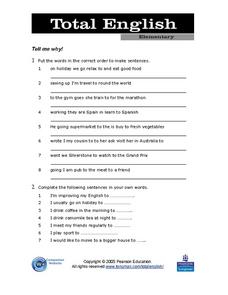EngageNY
Determining Cascading Consequences Using The Omnivore’s Dilemma: Industrial Organic Food Chain
Organic versus conventional farming: which option is best? Pupils use Michael Pollan's The Omnivore's Dilemma to determine the cascading consequences of the industrial organic food chain. They work in research teams to create an...
EngageNY
Analyzing Author’s Purpose: Industrial Food Chain
Using an Author’s Purpose anchor chart, groups examine a variety of text to determine the author's purpose. They then apply what they have learned to The Omnivore’s Dilemma. In pairs, they discuss what the text is about and why...
Curated OER
Organisms and Their Environments
Students study a local ecosystem and research the organisms to create a food web. For this ecosystem lesson, students view a video and answer questions. They visit a local ecosystem and make a list of organisms to research. Students...
Curated OER
Fresh Foods from Farm to Table
Are you a good egg? Learners begin a farm-to-table lesson by acting out verbs in groups to demonstrate the egg production process, and then research the steps using online resources. Several excellent videos are linked through the...
Curated OER
Organisms and Their Environment
Students observe elements of a local ecosystem and gain an understanding of what elements make up an ecosystem. For this ecosystem lesson students create a class food web that shows the interactions among the elements of the...
Albert Shanker Institute
Economic Causes of the March on Washington
Money can't buy happiness, but it can put food on the table and pay the bills. The first of a five-lesson unit teaches pupils about the unemployment rate in 1963 and its relationship with the March on Washington. They learn how to create...
Polar Trec
Animal Monitoring Introduction
Not only do mealworms taste great, they are also great for classroom science lessons. In pairs, young scientists observe and record what they see as they check out what their mealworms are doing from minute to minute. Each minute...
Curated OER
Edible Algae
Students acquire an awareness and appreciation for the value of the organisms in the Protist Kingdom. They identify common Protists, name them and list some common products that contain marine algae.
Curated OER
Matching Meals Nutrition
Students play a matching game to practice pairing foods with their food groups. In this health and nutrition lesson, the class discusses food choices, then students play an on-line memory game.
Curated OER
Comparing-Contrasting With Cookies
Students compare and contrast cookies. In this compare and contrast lesson plan, students complete a graphic organizer and identify the similarities and differences in Girl Scout Cookies. Students write an analysis.
IBM
The Human Body
Every moment, the systems in your body are working together to keep you breathing, standing, and thinking. Elementary schoolers explore the human body and its systems with an impressive, 15-page lesson plan that should leave your...
Concordia College Archives
Introduction and Student Inquiry
Introduce young musicians to the history of and different styles of music with an inquiry-based learning activity that asks them to play detectives to determine the similarities and differences among the sheet music found at a series of...
Curated OER
Sentence Order: "Tell Me Why!"
In this sentence order worksheet, students rearrange words to correctly put sentences together. Then they complete sentences in their own words. There are sixteen questions to complete.
Curated OER
The Akron Global Polymer Academy Lesson Plan Format
Students identify types of garbage that will decompose quickly and the ones that do not. In this decomposing lesson students observe and record the photo degrading of six pack rings.
Curated OER
Oragami Village Diorama
Students take advantage of the qualities and characteristics of art media, techniques, and processes to enhance communication of their experiences and ideas. Then they select and evaluate a range of subject matter, symbols, and ideas of...
Curated OER
Fun Photosynthesis
Second graders, using large colored poster board, explore photosynthesis and its effect on the food chain and survival of organisms.
Curated OER
The Rainforest Community
Students create a miniature rainforest ecosystem, a terrarium. Students then explain how the continuous flow of energy and food in the ecosystem allows it to sustain itself.
Curated OER
Egyptian Civilization
Fifth graders explore facets of ancient Egyptian life. In this lesson on ancient civilizations, 5th graders find the location of ancient Egyptian nations on a world map and describe the climate and features. They explain how post...
Curated OER
Organizational Patterns: Comparison and Contrast Writing
Learners write an essay comparing and contrasting their school experiences. Through guided practice, they create an outline of their elementary school experience and middle school experience. Using their outlines, students synthesize...
Science Friday
Ugh, a Bug!
Young entomologists familiarize themselves with the physical characteristics of insects. Composed of two activities, each lesson involves your scientists tapping into their prior knowledge of bugs and making observations of real live...
Curated OER
Human Body Lessons
Students read "The Magic School Bus in the Human Body" and discuss the importance of maintaining a healthy body. They create a hinge and joint paper skeleton, follow the journey of a hamburger through the digestive tract, jump rope and...
Science Matters
Lotusland
It's time for a field trip! Scholars take their new-found knowledge of adaptations and seed dispersal on a field trip to a local botanical garden. They gain an up-close look at how ecological interdependence works in a distinct...
Curated OER
Puffin Patrol
Bird diversity and the majestic puffin are the topics of today's lesson plan. Children discuss and look at images of puffins, and then they use felt to put a puffin body together. After that they talk about what and how puffins eat. They...
Curated OER
The External Anatomy of the Crayfish
Students investigate the external anatomy of a crayfish. In this arthropod lesson plan, students study the structures of the head, the body and the appendages of a crayfish. They locate specific structures present in arthropods and...























